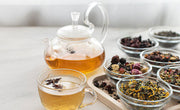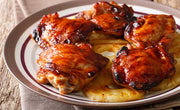Is Herbal Tea Hydrating?

Human beings require water to survive. While you can get some hydration by consuming vegetables and fruits, it's just not enough.
Whether it is warm or cold outside, it is important we remember to stay hydrated. Did you know you drinking tea can help with hydration?
Nearly two-thirds of the human body is water, and water is essential to proper bodily function. It helps transport nutrients into cells and waste products out of cells. It’s necessary for all digestive, absorption, circulatory, and excretory functions, as well as for assimilating water-soluble vitamins. Water also helps maintain proper body temperature.
And believe it or not, it even helps with fat loss. Think about it: If you’re dehydrated your body won’t function properly, and even mild dehydration can slow your metabolism by impairing your cells’ ability to metabolize glucose. This means the blood sugar delivered to cells that are supposed to be used as energy won’t get used, and guess what happens next? It gets stored as fat.
Water also transports nutrients to and from cells, delivering blood sugar and vitamins when they’re needed for energy and cell repair, and shuttling away metabolic wastes to keep cells healthy and toxin-free. Clearly, it’s in your best interest to drink plenty of water throughout the day, every day before you show the signs of dehydration.
What are the Symptoms of Dehydration?
If you experience these symptoms, it most likely means you starting to show signs of dehydration:
- Reduced urination
- Overly dry skin
- Dizziness
- Rapid heartbeat
- Rapid breathing
- Sunken eyes
- Lack of energy, sleepiness, confusion, or irritability
- Fainting
Plus, the more active you are, the more water you lose through sweating and urination. If your urine is dark, you need to be more conscious of drinking fluids. But that's not the only benefit of hydration.
8 Reasons to Stay Hydrated
- Headache relief
- Mental alertness
- Body weight
- Healthy skin
- Digestion
- Balanced blood pressure
- Joint health
- Detoxification
How to Stay Hydrated
Some people are confused about how much water to drink, especially when they first start a diet or training program. A typical person loses about two quarts of water daily just from breathing, urinating, and sweating.
The standard recommendation is to drink at least a half-gallon to one gallon a day of straight-up water. Around workouts, have one to two glasses beforehand, sip water frequently throughout your session and have at least one to two glasses afterward. Sports drinks can be a good substitute as they can also provide much-needed electrolytes, but make sure the sport drink you choose isn't loaded with sugar.
Do Herbal Teas Count as Water Intake?
Decaffeinated teas also count as fluid intake as long as they don't have added sugar or cream. But watch out for caffeinated products since caffeine can dehydrate your cells. If you need the energy boost that caffeine provides, drink water (and plenty of it) afterward to counteract the effects.
Caffeinated teas
You have probably heard that caffeine dehydrates. But caffeinated tea can still add to your bodily fluids. Tea with caffeine is a diuretic because caffeine causes our kidneys to release more water.
However, it would take about 500mg of caffeine to cause any diuretic significance. With 35-50mg of caffeine per cup of black tea, that's 10-15 cups of black tea per day. That's a lot even for my tea addiction.
Even with the mild diuretic effect of caffeinated tea, the body absorbs the fluid it needs before disposing of the rest. Making it unlikely that you'd pee out more than you drink. With everything in moderation, black tea can be a source of hydration.
Does Herbal Tea Dehydrate You?
Caffeine content is what adds the diuretic effect causing more frequent urination. However, most teas are very low in caffeine, so consuming normal amounts of tea – under 4–8 cups at once (which is a lot of tea at one sitting) – is unlikely to cause any dehydrating effects.
It's important to remember that not all types of tea have the same diuretic effect. Black tea may have a mild diuretic effect due to its caffeine content. Herbal teas that are caffeine-free and do not have the same effect. In fact, herbal teas can be a great alternative to water when it comes to hydration.
One of the benefits of herbal teas is their ability to help relax you. Whether it's chamomile, lavender, or peppermint, these teas have natural properties that can calm your mind and body. So, if you're feeling stressed or anxious, sipping on a cup of herbal tea can be a soothing way to unwind.
Additionally, herbal teas provide a flavorful way to hydrate. With a wide variety of flavors to choose from, you can find a tea that suits your taste preferences. Whether you enjoy fruity blends, floral infusions, or spicy concoctions, there's a herbal tea out there for everyone.
If you add milk or sugar to your tea, it may not hydrate you as much. Adding these can make your tea taste better, but too much can give you extra calories and not hydrate as much. To get the most hydration from herbal tea, drink it plain or with a bit of lemon for taste.
Hydration is Not the Only Benefit of Herbal Tea
Herbal tea has many other benefits to consider when looking to hydrate. When you get dehydrated, one of the first symptoms can be...
Herbal Tea for Constipation
Dehydration is a direct cause of constipation. Herbal teas can help aid in relieving constipation. Consuming hot tea is an excellent strategy to increase water intake.
Keeping yourself hydrated is a natural solution for constipation. The warmth of tea can also stimulate digestion and relieve symptoms.
Herbal Tea for Headaches
A bad headache can ruin your day and make it hard to focus on anything else because of the pain. Top teas for easing headaches and migraines include chamomile tea, peppermint tea, ginger tea, clove tea, turmeric tea, and lavender tea.
Herbal Tea for a Cough
Give your nagging cough some relief from tea. Many herbal teas help ease a cough:
- Ginger or chamomile tea help reduce inflammation in the throat
- Hibiscus tea has a high concentration of vitamin C
- Tea with echinacea helps reduce the life and severity of the cough
- Peppermint tea commonly used in cough drops, peppermint helps open and reduce inflammation in the airways
- Licorice Root tea has been used for centuries to combat illnesses that result in sore throats. This is due to its antioxidants and anti-inflammatory properties.
- Slippery Elm, often found in throat lozenges, helps speed the recovery of your scratchy throat.
The best herbal tea for a sore throat? Throat Soother Tea. This herbal infusion aids in relieving a sore throat and cough with the help of licorice, soothing anise, and fresh raspberry leaves.
Plus the slippery elm provides a throat coat. Orange Citrus adds a boost of vitamin C and helps reduce swelling. These teas from the Slippery Elm are also great herbal teas for a cold.
Herbal Anxiety Tea
Herbal teas may be helpful for reducing stress and feelings of anxiety.
- Peppermint tea is a natural antispasmodic to help you relax. If your stomach takes the brunt of your stress, try a cup of Peppermint tea to calm your digestive system. By relaxing your muscles, peppermint may also ease a headache brought on by tension. Peppermint tea can provide a feeling of calm and balance in a life that can sometimes be overwhelming.
- Chamomile tea naturally boosts serotonin and melatonin levels to relax you and relieve tension headaches that often come with feelings of anxiety.
- Passionflower tea provides our body with phytochemicals and alkaloids, which may help reduce a build-up of stress chemicals. When you feel calmer, your sleep quality improves.
Herbal Tea for Acid Reflux
Symptoms of acid reflux can leave you feeling uncomfortable and exhausted. Those who struggle with acid reflux know to avoid certain food and beverages that can trigger it. It is a fairly common issue, and drinking tea may just provide the needed relief.
- Ginger tea is rich in compounds that help reduce inflammation and ease gastric contractions and irritation.
- Licorice tea has been used as an herbal remedy for thousands of years. The active compound in licorice can increase mucus while helping to protect the stomach and esophagus from acid.
- Chamomile tea is a calming tea that can help combat stress which is a common cause of acid reflux.
- Slippery Elm tea has coating properties that can soothe and protect the inflamed lining of the stomach and esophagus. By helping produce mucus, further irritation of the esophagus and stomach may be reduced.
- Turmeric tea is another ancient remedy with anti-inflammatory and antioxidant properties. The active ingredient, curcumin, helps protect the body's digestive tract.
- Tea with fennel may help digestion and relieve upset stomach due to gas. Its anti-inflammatory properties may also help ease swelling of the digestive tract.
Herbal Teas that Detox
To safely detox your body, hydrate, eat well, exercise, get a good night's sleep, and avoid junk food. Herbal detox tea can naturally cleanse, boost energy, support immunity, and create calmness.
- Tea Tox tea may help your body rid itself of harmful pathogens and free radicals
- Chamomile tea for relaxation and decompression
- Peppermint tea helps improve digestion and boost immunity
- Ginger and Turmeric tea is rich in antioxidants and nutrients that help cleanse
A Few Fun Facts About Water
- Water is the most common substance on earth.
- Pure water has a neutral pH of 7, which is neither acidic nor basic.
- Your brain is 70 percent water.
- By the time you feel thirsty, you’ve lost 1 percent of your total water.
- 6,800 gallons of water is required to grow a day’s food for a family of four.
- It takes 20 gallons of water to create one pint of beer.
- A jellyfish is 95 percent water; so is a cucumber.
- A person can live only one week without water but can live a month without food.
SOURCES:
https://www.medicalnewstoday.com/articles/322624
https://healthcareassociates.com/what-tea-is-best-for-acid-reflux-7-herbal-teas-and-other-drinks-to-try/





